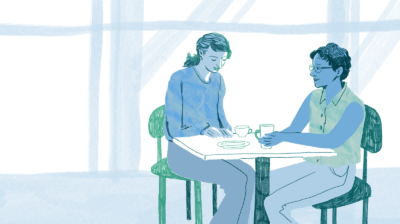How I live with the grief of losing my best friend to suicide
Having lost her best friend to suicide, Isabel recalls a journey of grief, forgiveness, and keeping memories alive with acceptance.

CW // This piece discusses suicide. Please look after yourself if you choose to read on. Our text support service details are listed below.
I lost my best friend to suicide over 3 years ago now. I will never forget getting the phone call, that phone call I never wanted to get. From that moment, my world turned upside down. It was during lockdown so I wasn’t able to attend her funeral which happened 2 months later, nor did I see her family for over a year later. Watching her funeral on a screen was surreal and made the grieving process even harder.
People told me that grief gets easier with time but I didn’t want to hear it. I found the ‘five stages of grief’ unbearably frustrating. Grief is messy and unpredictable. It can’t be put in a box or summed up by a set of steps like a recipe.
I’ve since noticed that death and particularly death by suicide can bring up uncomfortable feelings for those around us They might try and shy away from the subject or want to wrap it up in sayings so as not to think about it too much.
Processing my friend’s suicide
I spent a lot of time crying and feeling like everything was pointless. Then the feelings of anger hit. I was angry at her for leaving, but also angry at the world that she felt it was her best option. I still wrestle with questions, but it’s no longer as all-consuming as it once was.
At first, I didn’t want the sadness to pass. I thought if I wasn’t sad anymore it meant that I was forgetting her and that ultimately she didn’t mean that much to me. I didn’t want to do “fun” things, especially not if it was doing things I knew she enjoyed doing. It didn’t feel right. I was worried about moving on with my own life. I had just graduated and was planning on moving to a new place.
Forgiveness helped me grieve
In a way, I was lucky to be able to move to somewhere without emotionally charged memories but I felt guilty that I was forgetting her and shouldn’t be moving on without her. I also felt guilt that I hadn’t done enough, wasn’t a good enough friend and that if I had done something differently she’d still be here. I found the guilt hardest to deal with. People saying that it was not my fault didn’t make a difference, I had to forgive myself, forgive her and accept her death.
For a long time, I wasn’t able to watch the tv series we used to watch together or do activities we had planned to do together. Now when I watch them, I think of her and imagine her reaction to plot points or remember how we watched certain episodes together and who her favourite characters were.
No set timeline with grief
The grief is no longer as raw and painful as it was and that doesn’t mean that I’m forgetting her or that she is less important to me now. I’ve come to terms with the fact that it’s ok to be happy, it’s ok to not think about her all the time and it’s ok to do things we enjoyed doing together.
Expressing grief can also be happy. The feelings I have about her death have ups and downs, grief has no timeline and most of all there is no one way of doing things to cope with loss. Over the first few months, I felt a lot of pressure to return to “normal” life. Now I know that I can take my time. It’s ok to still cry at things that remind me of her and it’s also ok to sometimes push it away or feel numb.
Contacting her other friends has been so helpful in living with the gap her not being here has left. I can talk about her with someone who knows her, share memories and laugh about the good times we had. I can talk to them when I miss her and we can share that sadness. I know they understand what I’m feeling. I’m accepting that it’s ok for my feelings to change and it doesn’t mean I’m forgetting her or that she wasn’t important to me. I know she would want me to live my best life and would be so proud of me. Sometimes, when something exciting happens, she’s the first person I want to call and tell. She was my cheerleader and was always so supportive. When I need advice or reassurance, I often wish I could talk to her.
Keeping her memory alive
What once scared me so much is starting to happen. I’m slowly forgetting what her laugh and voice sound like. Just after her passing, I started a scrapbook with pictures of us, cards she gave me and screenshots of our messages and her Instagram posts.
This way, even though memories are getting jumbled, I have everything in one place. The scrapbook also gives me something concrete to look at when I miss her. I’ve stayed in contact with her family and have been able to visit them. Seeing her room and going to the house brings up so many memories, yet is also comforting because I know she’s being remembered and that I’m not alone in feeling the gap she’s left. Her family have been wonderful and we send each other messages from time to time to stay in touch. It’s comforting to know she’s still a part of our lives, albeit very differently.
I’ve accepted that I can return to “normal” life, make new memories, and build new friendships. I have talked to my friends I’ve made since then about her. Our friendship was such an important part of my life, I don’t want it to feel like she never existed. Sometimes I’ll share a memory or a story about her and it’s a nice feeling to talk about her. Her birthday and anniversary bring up a lot of mixed feelings and I’m grateful to have such supportive friends, especially those who didn’t know her.
Having people I can share memories with and spaces where I can remember her has been so important in helping me to live my life while also processing my own feelings and remembering her. Watching her favourite films or series, playing Just Dance, going to specific places, looking at the scrapbook, chatting with her friends or messaging her family, all help me live with my grief.
I made a playlist of some of her favourite songs that always makes me smile and remember her bubbly self. I appreciate it when my friends ask me about her, how we met, what we did together, what she was like or offer to spend time together on her anniversary since they know I find it overwhelming.
I was at a music festival this summer and one of the groups spoke about a person they had lost to suicide and played a song they had written for him. The friends I was with knew why I was upset and were able to be there for me. They are great at recognising situations I might find difficult. I’ve gotten better at saying when I’m feeling upset instead of pushing it away.
This year I spent her anniversary with one of her friends. I put pressure on myself around what I “should” be feeling so I ended up feeling quite zoned out. It was only the day after that I was able to think about it.
Trying to avoid grief
Sometimes I find it hard to let myself remember her because I know it’s going to be painful so I avoid it. Grief is like pushing an inflatable ball under water, you can try and push it down but at some point, it’s going to fly up in the air and you can’t control its height or direction and it comes splashing down. The more I try to push down the difficult feelings, the harder it is to process when they all come to the surface all at once.
Most days, I no longer think about her. Three years on, it’s just as often in a happy context as a sad one. My church community has been a huge support in coping with the ongoing sadness, anger, guilt and questions I hold. Speaking about it with people who share my faith is comforting because it offers a new perspective and most importantly, hope.
With time I’ve accepted that there are questions that will go unanswered. Believing in something bigger gives me the strength and courage to live my life to the fullest in a way she could not.
I try to channel the residual anger into volunteering, activism and making changes that might make a difference for other people who experience suicidal thoughts and make the world a kinder place. There will always be a hole in my life left by her absence, as time passes it doesn’t get smaller but what’s around it gets bigger. Most of all, I’m grateful to have known her and for the time we had together.
HUGG offer hope and healing by providing information, telephone support and local peer support groups led by volunteers with lived experience. If you would like to attend a HUGG Group just complete the form here ‘join a group’ or call them on 01 513 4048 (monitored answering machine) or email [email protected] for more information.
Feeling overwhelmed and want to talk to someone?
- Get anonymous support 24/7 with our text message support service
- Connect with a trained volunteer who will listen to you, and help you to move forward feeling better
- Whatsapp us now or free-text SPUNOUT to 50808 to begin.
- Find out more about our text message support service
If you are a customer of the 48 or An Post network or cannot get through using the ‘50808’ short code please text HELLO to 086 1800 280 (standard message rates may apply). Some smaller networks do not support short codes like ‘50808’.





